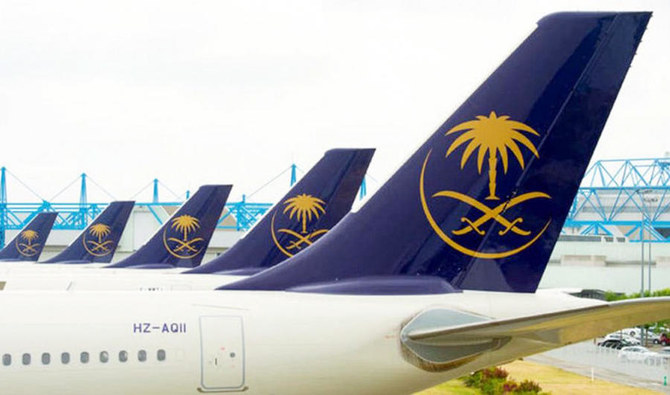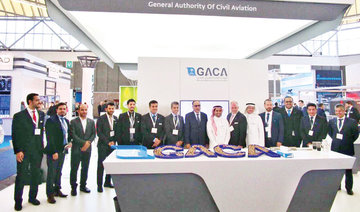RIYADH: The General Authority of Civil Aviation’s (GACA) Academy of Civil Aviation will open its doors to applicants with high school diplomas in natural sciences for its diploma and fast-track programs.
Fields included in the programs include fire and rescue training and airport operation, with applications open from Sunday June 30 until July 20, through the academy website www.saca.edu.sa.
Applicants for the higher diploma for fire and rescue should be Saudi nationals between 18-23 years of age (according to the Hijri calendar). The applicants must have a high school certificate in natural sciences with a grade of at least 80 percent, an aptitude test score of 70 percent and an achievement score of 65 percent. Applicants must also have a score of at least 40 in the English language test from the National Center for Measurement.
The academy requires applicants who apply for different fast-track programs.
Saudi aviation academy opens admissions
Saudi aviation academy opens admissions

- The applicants must have a high school certificate in natural sciences with a grade of at least 80 percent, an aptitude test score of 70 percent and an achievement score of 65 percent
Saudi Arabia condemns attack on Port Sudan

- Saudi Arabia has condemned the recent RSF attacks on vital facilities in Port Sudan and Kassala
RIYADH: Saudi Arabia has condemned and strongly denounced the recent attacks on vital facilities in Sudan, in Port Sudan and the eastern border town of Kassala.
The Saudi Ministry of Foreign Affairs said the Kingdom reaffirmed its rejection of such attacks, saying it “threatens regional stability and Arab national security.”
The ministry also said the solution to the current crisis is only through political means and that it must respect Sudan’s sovereignty and unity.
The Kingdom also underlined the importance of adhering to the commitments outlined in the Jeddah Declaration, which aims to safeguard civilians in Sudan.
The paramilitary Rapid Support Forces on Sunday struck Port Sudan with drones, targeting Osman Digna air base, a goods warehouse and some civilian facilities.
The RSF, at war with the regular army since April 2023, have increased their use of drones since losing territory, including much of the capital Khartoum, in March.
#بيان | تعرب وزارة الخارجية عن إدانة المملكة العربية السعودية واستنكارها استهداف المرافق الحيوية والبنية التحتية في "بورتسودان وكسلا" بجمهورية السودان، وهو ما يمثل تهديداً للاستقرار الإقليمي والأمن الوطني العربي والأفريقي pic.twitter.com/HJQ7zXc2Cr
— وزارة الخارجية (@KSAMOFA) May 4, 2025
Visitors drawn to historic mosques pavilion in Jakarta

- Pavilion featured illustrated panels and information on mosques that have played a pivotal role in Islamic history
- Presented in a visually engaging and informative manner, the exhibition included rare photographs and detailed architectural renderings
RIYADH: Visitors to the Jusoor exhibition, which was organized by Saudi Arabia’s Ministry of Islamic Affairs in Jakarta, Indonesia, were attracted to the pavilion showcasing the historic mosques in Makkah and Madinah.
The pavilion featured illustrated panels and information on the mosques that have played a pivotal role in Islamic history, the Saudi Press Agency reported.
Among them were the Quba Mosque — the first established in Islam — and the Al-Qiblatain Mosque, where Prophet Muhammad received the command to change the qibla (direction of prayer). Also featured was the Al-Jum’ah Mosque, where the Prophet is said to have led his first Friday prayer. Other historically significant mosques were also highlighted.
Presented in a visually engaging and informative manner, the exhibition included rare photographs and detailed architectural renderings that placed the spotlight on the spiritual importance of these sacred sites.
It also reinforced the deep emotional and historic connection Muslims around the world have with the legacy of the Prophet’s life and mission, the SPA added.
The pavilion was part of the exhibition’s broader goal to promote Islamic values and underscore Saudi Arabia’s leading role in preserving, maintaining, and documenting historic mosques as part of its custodianship of Islamic heritage.
Jeddah’s Balad Al-Fan Festival is haven for creative souls

- Festival features art competitions, workshops, cultural talks, weekend markets, and live music shows
JEDDAH: Jeddah’s historic Al-Balad district has once again transformed into a vibrant hub of art for the second Balad Al-Fan Festival, which runs until June 13.
The festival, which began on April 5, and is organized by Zawiya 97 in cooperation with the Ministry of Culture, features more than 90 events, including artistic competitions, creative workshops, cultural talks, school workshops, live shows, and weekend markets.

Abdulrahman Al-Aseri, managing director of Zawiya 97, told Arab News: “Building on our mission at Zawiya 97 to enhance the cultural and artisanal presence in Historic Jeddah, we place creativity at the heart of our vision by bridging living heritage with the spirit of contemporary innovation. Through our participation in Balad Al-Fann 2, we present more than 90 artistic and craft events aimed at reviving Historic Jeddah with a crafting energy.”
The festival includes four themed weekends: handmade crafts; nature and sustainability; youth weekend; and “A Sweet-Scented Farewell,” which focuses on Al-Balad apothecaries.
HIGHLIGHT
The festival includes four themed weekends: handmade crafts; nature and sustainability; youth weekend; and ‘A Sweet-Scented Farewell,’ which focuses on Al-Balad apothecaries.
“This season, we have designed a vibrant platform that celebrates traditional crafts, reimagining them through sustainability, cultural storytelling, and youth empowerment,” said Al-Aseri. “We believe that creativity is not merely about having an idea, but about breathing new life into the timeless alleys of Al-Balad.

“With a new group of distinguished artisans joining our Artisans Incubator Program, we continue to build a community that preserves heritage and innovates for the future. We welcome everyone who shares this passion to be part of reviving Historic Jeddah.”
Visual artist Khloud Nass will be running one of the workshops. She said: “I have been working with Zawiya 97 for a year to train those who want to learn through workshops such as pottery.”

Azzam Al- Ghamdi from Dar Azzam will be working with fragrances including musk, oud, and rose, to showcase the art of perfumery using native plants of Saudi Arabia.
He told Arab News: “Traditional know-how and the perfect soil for growing aromatic plants in the Kingdom of Saudi Arabia have given perfume a central role in our lifestyle. (It is) deeply entrenched in Saudi culture. The use of perfumes for cultural and religious purposes dates back many centuries in this country.”

Beside showcasing his creativity, Al -Ghamdi is also training visitors in his workshops.
Hashem Al-Shawi is offering soap-making workshops at the festival. “Organic skincare methods have always proven reliable and I am so glad to be part of this festival and to share the different types of soap and the process of soap making,” he said.
The festival also offers visitors the chance to take part in various competitions, including “Your Creativity Revives Al Balad” and “Handcraft & Calligraphy,” which allows them to redesign Al-Balad’s pavements and public spaces into works of art, with the chance of winning cash prizes.
Saudi fund CEO sheds light on economic power of culture

- Al-Hugail emphasized the economic power of culture, saying that true investment extends beyond infrastructure or innovation alone and lies in securing the cultural sector’s lasting vitality within the economy
RIYADH: Saudi Arabia is advancing with unwavering confidence toward a brighter future, honoring its deep-rooted cultural legacy while drawing strength from an ambitious vision for a sustainable cultural sector, the CEO of the Saudi Cultural Development Fund said at Expo 2025 Osaka.
Majed bin Abdulmohsen Al-Hugail virtually took part in a panel discussion, titled “Creative Sustainability: Investing in Culture with Long-Term Impact.”
The Saudi Cultural Development Fund is committed to driving long-term impact and sustainable growth within the cultural sector through innovative solutions and strategic partnerships between the public, private, and nonprofit sectors.

Through pioneering solutions, the fund is contributing to turning Saudi Arabia’s cultural sector into a powerful economic force, while also fostering long-term sustainability — fully aligned with the ambitions of Vision 2030.
Al-Hugail emphasized the economic power of culture, saying that true investment extends beyond infrastructure or innovation alone and lies in securing the cultural sector’s lasting vitality within the economy.
By embracing visionary sustainable strategies, culture evolves into a living, breathing force, one that fuels economic prosperity, nurtures creativity, and weaves a stronger, more resilient social fabric.

During the panel discussion, Al-Hugail said: “At the Saudi Cultural Development Fund, sustainability is not just a goal; it is at the core of everything we do. Our approach is guided by key indicators that align with global Environmental, Social, and Governance standards.”
In pursuit of economic sustainability with lasting positive social impact, the Saudi Cultural Development Fund focuses on supporting businesses that build capabilities.
A notable example is the fund’s backing of the “CHEFPreneur” program, which has equipped 42 Saudi women with culinary and entrepreneurial expertise, empowering them with the skills to start their businesses in the culinary sector.
The panel also explored sustainable business models in the cultural sector. As funding landscapes continue to evolve globally, the sector is turning to innovative alternatives. This new wave of cultural financing includes emerging models such as public-private partnerships, which play a key role in fostering an economically sustainable cultural sector.
As an example, the fund has forged a pioneering collaboration with several leading Saudi banks and the Saudi Credit Bureau to strengthen its offerings and enhance the efficiency of credit decision-making processes.
Demonstrating its commitment to sectoral growth, the fund also contributed 40 percent to the $100 million Saudi Film Fund, aimed at expanding the Kingdom’s film industry, attracting private sector investment, and driving the sector’s long-term development.
Last year, the fund launched “Cultural Financing,” an inclusive umbrella of financial services designed to support micro, small, and medium-sized cultural enterprises across all stages of the value chain — fostering the growth and expansion of cultural projects.
Al-Hugail concluded the panel discussion by saying: “Through international exhibitions like Expo 2025 Osaka, visitors can experience Saudi Arabia’s rich cultural diversity and preview a forward-looking vision of the country’s future.”
He added: “The Kingdom’s participation at Expo 2025 Osaka is bringing the best of Saudi Arabia to the world stage and providing an opportunity for the world to witness Saudi Arabia’s remarkable transformation.”
The fund is taking part in Expo 2025 Osaka within the Saudi Arabia Pavilion, highlighting the Kingdom’s strategy to position culture as a major economic force while ensuring its sustainable growth.
This aligns with both the National Cultural Strategy and Vision 2030, which focus on diversifying the national economy, with the fund serving as a primary financial enabler for the cultural sector.
Saudi academy concludes Arabic program in Spain

- Activities featured an exhibition, seminars, training courses, language proficiency tests and student competitions, organized in partnership with Spanish universities and institutions
RIYADH: The King Salman Global Academy for Arabic Language has concluded its Arabic Language Month program in Spain, the Saudi Press Agency reported.
Held throughout April, the initiative is part of the academy’s global project to support Arabic education for non-native speakers and promote collaboration with international academic and cultural institutions.
The program included a range of educational and cultural events across Spanish cities such as Madrid, Granada and Cordoba.
Activities featured an exhibition, seminars, training courses, language proficiency tests and student competitions, organized in partnership with Spanish universities and institutions.
Key collaborators included Casa Arabe, Rey Juan Carlos University, the Autonomous University of Madrid and the University of Granada.
Targeting Arabic learners, educators and specialists, the program offered training sessions, awareness activities and academic forums.
It concluded in Cordoba with an introductory lecture and open forum for Arabic language enthusiasts.
The lecture outlined the academy’s global vision, highlighted its international projects and explored future partnerships with Spanish institutions.
The initiative has also been implemented in countries such as Uzbekistan, Indonesia, China, India, France, Brazil, Thailand and Malaysia, expanding its global reach.






















